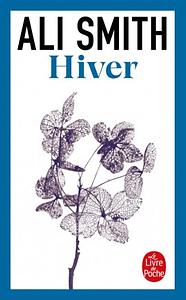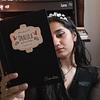You need to sign in or sign up before continuing.
Take a photo of a barcode or cover
Ali Smith is such an original, confusing and all around brilliant author. This is the second of her seasonal quartet that I have read, as I’m trying to read them along with the seasons and in the intended order. Having read ‘Autumn’ a few months back, I was more in synch with Smith’s signature prose this time around.
‘Winter’ includes the narratives of Sophia, a woman in her sixties who is beginning to lose her mental faculties and exists in a state of confusion in her large family home, in which she resides alone. Between Sophia’s narratives, is that of her son, Art (short for Arthur), who pays a woman £1000 to pretend to be his girlfriend over Christmas as he has recently split with his ex girlfriend of three years, Charlotte. The narratives alternate between the present day setting and Sophia’s childhood, growing up with a rebellious older sister who is a political activist and also briefly covering the early years of Art’s life when Sophia first became a mother.
Smith’s fleeting between these perspectives in a non chronological order casts light on the overall transience and impermanence of time. Her prose is truly unique and once you give up on fully understanding what is going on at all times, it is a really enjoyable reading experience that no other author is able to rival. Her prose is clever, being both abstract and deeply rooted in reality as the novel additionally casts light on recent political affairs, such as Brexit, the country’s stance on immigration, the Grenfell fire and Trump’s power in America. There is frequent playing on words and a lot of hidden meaning behind supposedly benign and trivial things but yet the plot itself is captivating in and of itself.
I would say that I preferred this to Autumn, both because of the increased familiarity I had with the writing style and because of the intrigue of the characters. I found Lux an especially fascinating character and found my favourite passages where whenever she was on the page.
‘Winter’ includes the narratives of Sophia, a woman in her sixties who is beginning to lose her mental faculties and exists in a state of confusion in her large family home, in which she resides alone. Between Sophia’s narratives, is that of her son, Art (short for Arthur), who pays a woman £1000 to pretend to be his girlfriend over Christmas as he has recently split with his ex girlfriend of three years, Charlotte. The narratives alternate between the present day setting and Sophia’s childhood, growing up with a rebellious older sister who is a political activist and also briefly covering the early years of Art’s life when Sophia first became a mother.
Smith’s fleeting between these perspectives in a non chronological order casts light on the overall transience and impermanence of time. Her prose is truly unique and once you give up on fully understanding what is going on at all times, it is a really enjoyable reading experience that no other author is able to rival. Her prose is clever, being both abstract and deeply rooted in reality as the novel additionally casts light on recent political affairs, such as Brexit, the country’s stance on immigration, the Grenfell fire and Trump’s power in America. There is frequent playing on words and a lot of hidden meaning behind supposedly benign and trivial things but yet the plot itself is captivating in and of itself.
I would say that I preferred this to Autumn, both because of the increased familiarity I had with the writing style and because of the intrigue of the characters. I found Lux an especially fascinating character and found my favourite passages where whenever she was on the page.
emotional
hopeful
reflective
slow-paced
Plot or Character Driven:
Character
Strong character development:
Yes
Loveable characters:
Complicated
Diverse cast of characters:
Complicated
Flaws of characters a main focus:
Yes
2 ★’s — brilliant concept but it just wasn't for me.
i primarily read ali smith's winter because it's on boxall's 1001 books to read before you die list (#1315,) which i'm slowly but surely making my way through. i was quite looking forward to this one because of the overwhelmingly positive reviews but i think this is one of those books that just isn't for me.
winter is a contemporary fiction novel about a dysfunctional family gathering for the holidays. it's also about anger, relationships, politics, and the ties that connect all of these things together in our lives.
it's clear to me why ali smith's work is so popular. she makes witty references with clever word play and very flowery, quotable prose. at the beginning i really liked that because it showed a distinctive style while managing to keep the main message in focus, but page after page after page of constant witty references and idealistic quotes started to make it all seem a bit pointless. it felt like the references and prose were there for the sake of it rather than to highlight specific points for impact.
smith also conveys messages in a unique way through her characters and plot, which is refreshing and promising. winter was somehow both distant and objective in its characterization while also being intimate and in-your-face with the messaging. i wasn't a fan of the execution in this book, so ultimately it came off as pretentious and ineffectual to me, but i think there is a lot of promise in playing with narrative distance and themes in this way.
i hated the lack of quotation marks. i'm not sure why this seems to be a trend amongst some writers now, but it just makes dialogue cumbersome to read. at one point in this book there is an argument between two people that is literally lines of dialogue one after the other. the author used [brackets] and (parentheses) to indicate who was speaking. at that point... why wouldn't you just use quotation marks? it gave 2010's text-fic energy (not what i expected from a contemporary fiction novel) and cheapened the message.
the narration, which i read in tandem with the text, was really quite good though. melody grove did a fantastic job representing characters in different ways and made the entire reading process so much easier (especially with the lack of quotation marks.)
i can see why ali smith is such a celebrated author. there were aspects of this book that were unique and interesting, but the execution was not for me. that seems pretty common theme among the lower ratings though, many reviewers have mentioned loving some of her other work but not enjoying this one as much. i'll probably give another of her books a go and see if i can find that special gem i'm hoping for.
i primarily read ali smith's winter because it's on boxall's 1001 books to read before you die list (#1315,) which i'm slowly but surely making my way through. i was quite looking forward to this one because of the overwhelmingly positive reviews but i think this is one of those books that just isn't for me.
winter is a contemporary fiction novel about a dysfunctional family gathering for the holidays. it's also about anger, relationships, politics, and the ties that connect all of these things together in our lives.
it's clear to me why ali smith's work is so popular. she makes witty references with clever word play and very flowery, quotable prose. at the beginning i really liked that because it showed a distinctive style while managing to keep the main message in focus, but page after page after page of constant witty references and idealistic quotes started to make it all seem a bit pointless. it felt like the references and prose were there for the sake of it rather than to highlight specific points for impact.
smith also conveys messages in a unique way through her characters and plot, which is refreshing and promising. winter was somehow both distant and objective in its characterization while also being intimate and in-your-face with the messaging. i wasn't a fan of the execution in this book, so ultimately it came off as pretentious and ineffectual to me, but i think there is a lot of promise in playing with narrative distance and themes in this way.
i hated the lack of quotation marks. i'm not sure why this seems to be a trend amongst some writers now, but it just makes dialogue cumbersome to read. at one point in this book there is an argument between two people that is literally lines of dialogue one after the other. the author used [brackets] and (parentheses) to indicate who was speaking. at that point... why wouldn't you just use quotation marks? it gave 2010's text-fic energy (not what i expected from a contemporary fiction novel) and cheapened the message.
the narration, which i read in tandem with the text, was really quite good though. melody grove did a fantastic job representing characters in different ways and made the entire reading process so much easier (especially with the lack of quotation marks.)
i can see why ali smith is such a celebrated author. there were aspects of this book that were unique and interesting, but the execution was not for me. that seems pretty common theme among the lower ratings though, many reviewers have mentioned loving some of her other work but not enjoying this one as much. i'll probably give another of her books a go and see if i can find that special gem i'm hoping for.
challenging
informative
lighthearted
reflective
slow-paced
informative
reflective
medium-paced
Plot or Character Driven:
A mix
Strong character development:
Yes
Loveable characters:
Complicated
Diverse cast of characters:
Yes
Flaws of characters a main focus:
Complicated
hopeful
reflective
After reading Ali Smith’s ‘Autumn’, I had high hopes for this one — however, I just didn’t get it. I like that Smith’s writing style is a little elusive, but this felt a little too elusive and I was not really sure what to take from it, nor what the characters & story had to do with the political sections.
funny
reflective
medium-paced
Plot or Character Driven:
Plot
Strong character development:
Yes
Loveable characters:
Complicated
Diverse cast of characters:
N/A
Flaws of characters a main focus:
Yes
lighthearted
reflective
medium-paced
Plot or Character Driven:
Character
Strong character development:
No
Loveable characters:
Yes
Diverse cast of characters:
No
Flaws of characters a main focus:
Yes
Almost DNF’d this one after 50 pages, but I’m glad I persevered. I like the humour and the irreverent take on ideas, but I think Smith is heavy handed with her politics and indulges in her own jokes too much.
Look. I don’t want to insult Ali Smith (who is an amazing writer) but fuck me the plot of this was not good and the characters....... who were they ????
I’ll still read the next one but @AliSmith can it be more like Autumn?
Adding this on - tf with the floating head??? Y that never got explained????
I’ll still read the next one but @AliSmith can it be more like Autumn?
Adding this on - tf with the floating head??? Y that never got explained????
Weird. The first one was weird too. A good kond of weird though. The storytelling is confusing at first and sometimes obviously critical of the present moment, but everything comes together in the end. And I do wonder what happened to Lux. I think, if a book manages for me to care about a character‘s fate when the story has ended, it did all the right things for that character.
I know it's an odd thing to say for a 5-star book, but I find it challenging to articulate what exactly it is I so enjoyed about this. Besides the usual platitudes about the sincerity and intelligence of the writing - see: “Selfish. (His mother.)
Sophist. (His aunt.)
Solipsist. (His mother.)
Swotty little show-off. (His aunt.)
I know what you did with your life. (His mother.)
I know what you did with my life too. (His aunt.)”
- the historical callback (here to climate protests at Greenham Common, something I enjoyed more than the equivalent in Autumn), and the fact that I strangely see the power of this novel as lying in something beyond the historical specificities in which it is suffused, I also think that it's ultimately this last point - the way in which the work happily transcends its supposed category of political allegory into a kind of seasonal, silly, profligate, quietly optimistic bricolage of postmodern playfulness, that we are able to buoyantly interrogate art, politics, and family - these monumental concepts - without ever for a moment feeling tired about doing so.
Read these reviews for greater eloquence (and read the book!):
https://www.lrb.co.uk/the-paper/v40/n05/christian-lorentzen/the-collage-police
https://www.newyorker.com/magazine/2018/01/29/the-power-of-the-literary-pun
Sophist. (His aunt.)
Solipsist. (His mother.)
Swotty little show-off. (His aunt.)
I know what you did with your life. (His mother.)
I know what you did with my life too. (His aunt.)”
- the historical callback (here to climate protests at Greenham Common, something I enjoyed more than the equivalent in Autumn), and the fact that I strangely see the power of this novel as lying in something beyond the historical specificities in which it is suffused, I also think that it's ultimately this last point - the way in which the work happily transcends its supposed category of political allegory into a kind of seasonal, silly, profligate, quietly optimistic bricolage of postmodern playfulness, that we are able to buoyantly interrogate art, politics, and family - these monumental concepts - without ever for a moment feeling tired about doing so.
Read these reviews for greater eloquence (and read the book!):
https://www.lrb.co.uk/the-paper/v40/n05/christian-lorentzen/the-collage-police
https://www.newyorker.com/magazine/2018/01/29/the-power-of-the-literary-pun




